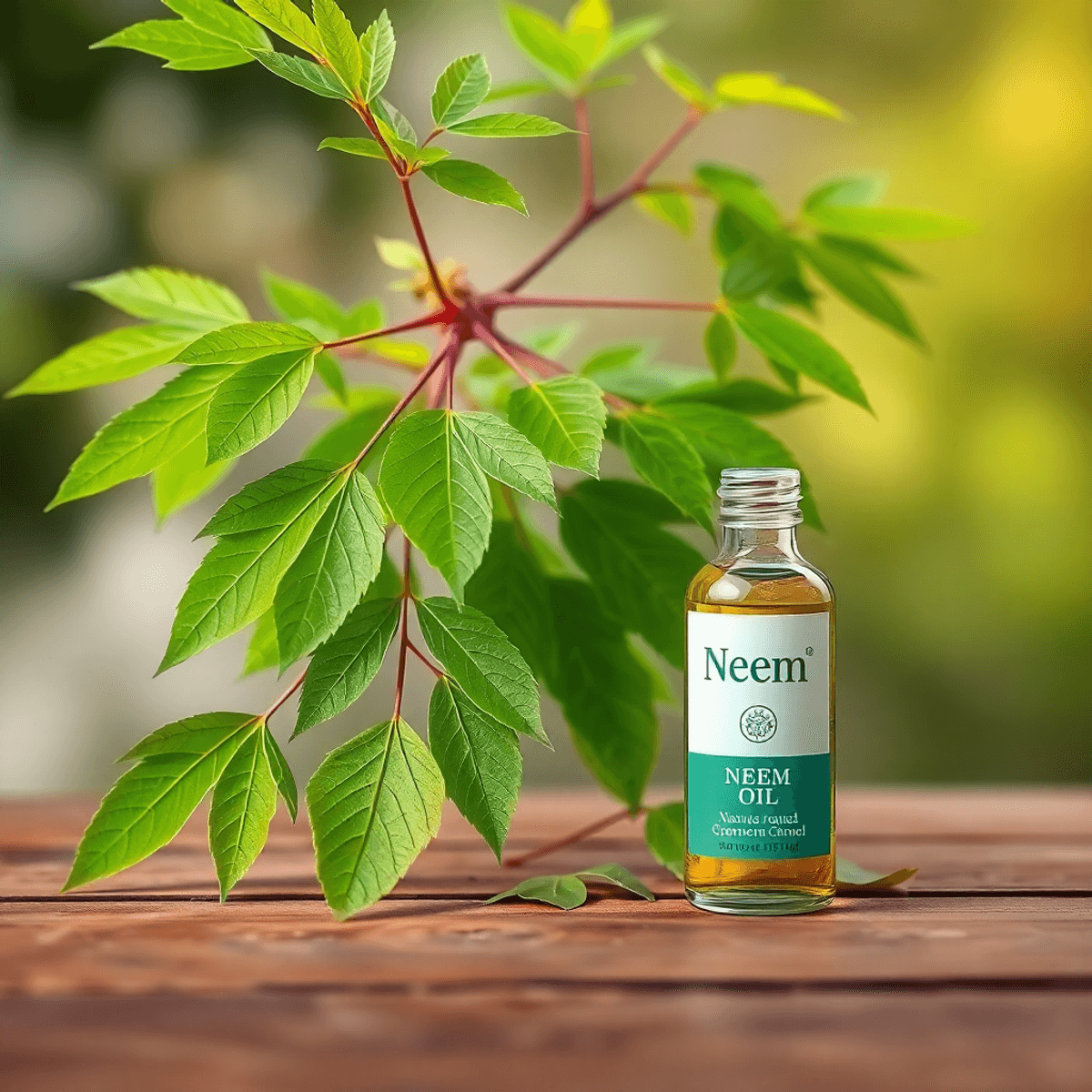Neem oil, extracted from the seeds of the neem tree, is a natural remedy that offers numerous benefits for facial skin care.With its powerful antibacterial and anti-inflammatory properties, neem oil effectively fights acne and calms irritated skin conditions
. Packed with fatty acids and antioxidants, it deeply moisturizes the skin, alleviating dryness and improving elasticity. These qualities make neem oil a valuable addition to any skincare regimen, addressing issues like dark spots, fine lines, and scars. Incorporating neem oil into your routine can result in healthier, glowing skin.
What is Neem Oil?
Neem oil is derived from the seeds of the neem tree, scientifically known as Azadirachta indica. This tree holds a significant place in history, revered for its medicinal and therapeutic properties across various cultures. Originating from the Indian subcontinent, the neem tree has been dubbed “the village pharmacy” due to its diverse health benefits.
Extraction Process
The process of obtaining neem oil involves several steps. The seeds of the neem tree are first collected and then crushed to extract their oil. This extraction can be performed through cold pressing or solvent extraction methods. Cold pressing is favored for producing high-quality oil, preserving its beneficial properties without chemical interference.
Chemical Composition
Neem oil boasts a rich chemical composition that contributes to its myriad skincare benefits:
- Fatty Acids: Contains palmitic, linoleic, and oleic acids which aid in moisturizing and nourishing the skin.
- Flavonoids and Polyphenols: Known for their antioxidant properties, they help in combating free radicals.
- Vitamin E: Provides additional protection against environmental damage.
- Antioxidants: Play a vital role in reducing signs of aging and improving skin texture.
This complex blend makes neem oil a potent ingredient in addressing various skin concerns.
Key Benefits of Neem Oil for Facial Skin
1. Moisturization and Hydration
Neem oil stands out as a natural remedy for hydrating and moisturizing the skin, offering a multitude of benefits for those struggling with dry skin. Its rich composition includes essential fatty acids such as palmitic, linoleic, and oleic acids. These components are key to its effectiveness in providing deep nourishment.
- Hydration: Unlike some commercial moisturizers that sit on the surface, neem oil penetrates deeply, locking in moisture and keeping the skin supple and soft.
- Fatty Acids: The presence of these fatty acids plays a crucial role in maintaining the lipid barrier of the skin. They help in retaining moisture, making neem oil an excellent choice for dry skin conditions.
Neem oil not only offers immediate relief from dryness but also contributes to long-term skin health by supporting its natural hydration processes. Regular application can result in smoother and more resilient skin, showcasing the profound benefits of neem oil on the face.
2. Acne Treatment
Neem oil is well-known for its ability to fight acne because it has bacteria-fighting properties. These properties specifically target and kill the bacteria that cause acne, leading to fewer breakouts. Additionally, the oil has anti-inflammatory effects that help reduce redness and swelling often seen with acne. This combination of actions not only treats current acne but also helps stop future outbreaks. Neem oil’s effectiveness in soothing irritated skin makes it a valuable part of any skincare routine focused on achieving clear, healthy skin.
3. Wound Healing and Scar Reduction
Neem oil offers significant benefits for skin, particularly in wound healing and scar treatment. The oil’s rich composition of fatty acids and antioxidants supports the natural process of tissue growth, allowing damaged skin to regenerate effectively. By promoting blood vessel formation, neem oil facilitates quicker healing times for wounds.
- Mechanism of Action: Neem oil encourages the proliferation of fibroblasts—cells critical for wound healing—which enhances collagen synthesis, crucial for skin repair.
- Impact on Scars: Regular use can lead to noticeable improvements in scar appearance, smoothing out uneven skin texture and reducing the visibility of blemishes.
This dual action of repairing tissue and refining texture makes neem oil a valuable addition to skincare routines aimed at scar reduction and overall skin health enhancement.
4. Anti-Aging Properties
Neem oil offers remarkable benefits for aging skin, helping to minimize wrinkles and fine lines. The presence of vitamin E and essential fatty acids in neem oil enhances skin elasticity, providing intense hydration and nourishment. These components help maintain the skin’s natural barrier, reducing dryness and preventing premature aging signs.
Antioxidants play a crucial role by neutralizing free radicals that contribute to skin aging. By integrating neem oil into your skincare routine, you can combat oxidative stress, promoting a youthful complexion and smoother texture. This natural approach supports maintaining vibrant and resilient skin as part of a comprehensive anti-aging strategy.
5. Soothing Irritated Skin Conditions
Neem oil is well-known for its soothing properties, making it a popular choice for irritated or sensitive skin. It has been proven effective in treating conditions like psoriasis and eczema. The oil’s anti-inflammatory compounds help to reduce redness and discomfort, providing relief to dry, itchy patches. By enhancing hydration with its rich blend of fatty acids, neem oil supports the skin’s natural barrier, fostering a calmer complexion.
Benefits of Neem Oil for Skin Conditions
- Psoriasis and Eczema Relief: Neem oil’s ability to alleviate symptoms like itching and scaling is highly valued.
- Irritation Reduction: Its soothing effects offer comfort for those with sensitive skin, promoting overall skin health.
Exploring these benefits of neem oil for the skin can lead to significant improvements in managing common dermatological concerns.
6. Balancing Oil Production
Neem oil is a powerful tool for controlling sebum production, making it perfect for people with oily skin. By regulating oil levels, neem oil can stop pores from getting blocked, which often leads to breakouts. The essential fatty acids in neem oil play a key role in keeping the skin moisturized while reducing excess oil. This twofold effect benefits both dry skin by providing hydration and oily skin by minimizing shine. If you’re looking for a natural way to manage sebum production, neem oil is definitely worth considering as a proactive solution to common skincare issues.
7. Reducing Hyperpigmentation
Neem oil is highly beneficial for individuals struggling with hyperpigmentation and uneven skin tones. Dark spots can be reduced due to the oil’s ability to control melanin production, resulting in a more uniform complexion. Its abundant content of fatty acids and antioxidants is crucial in healing damaged skin cells and encouraging a brighter look. By addressing uneven skin tone, neem oil not only lessens discoloration but also improves the overall texture and glow of your face. This makes it an essential part of any skincare routine aimed at attaining clear, radiant skin.
20% off for NEW CustomersHow to Incorporate Neem Oil into Your Skincare Routine
1. Direct Application Method
Using neem oil for your skincare routine can be a simple yet effective way to reap its numerous benefits. When considering the direct application method, you must prioritize safety and efficacy. A crucial first step is conducting a patch test. This helps determine if your skin will react negatively to neem oil, ensuring a safe introduction into your regimen.
Importance of Conducting a Patch Test
Some individuals may experience allergic reactions or irritation when using neem oil directly on the skin. Testing a small area first can prevent discomfort and adverse reactions.
How to Conduct a Patch Test:
- Select a discreet area: Inside of the wrist or behind the ear is ideal.
- Clean the area: Use mild soap and water, then pat dry.
- Apply neem oil: Dab a small amount onto the chosen spot.
- Wait and observe: Leave it on for at least 24 hours, checking for redness, itching, or any other signs of irritation.
If no adverse reactions occur, proceed to incorporate neem oil into your facial care routine.
Applying Neem Oil Directly on the Face
Step-by-Step Guide:
- Cleansing: Begin with clean skin; wash your face with a gentle cleanser and pat dry.
- Application: Use a few drops of neem oil, gently massaging it onto your face in circular motions. Focus on areas needing extra attention, such as acne-prone zones or dry patches.
- Absorption: Allow the oil to absorb naturally into the skin before applying other skincare products.
Frequency of Use:
Start by applying neem oil once or twice a week to allow your skin to adjust. Gradually increase usage as tolerated.
Neem oil’s potent properties can make it an effective addition to your skincare routine when used correctly through direct application. With careful patch testing and mindful application, you can harness its benefits safely.
2. Mixing with Carrier Oils
Using neem oil in your skincare routine offers various benefits, especially when combined with carrier oils. This method is particularly advantageous for those with sensitive skin, as it provides a gentle way to introduce neem oil’s potent properties.
Recommended Carrier Oils:
- Coconut Oil: Known for its moisturizing and antimicrobial properties, coconut oil pairs well with neem oil to enhance skin hydration and combat bacteria. This combination can be especially effective for dry or acne-prone skin.
- Jojoba Oil: Resembling the natural oils of the skin, jojoba oil helps balance sebum production. When mixed with neem oil, it aids in preventing breakouts while maintaining skin elasticity and smoothness.
The process of dilution using carrier oils not only reduces the risk of irritation but also allows you to enjoy the full spectrum of benefits neem oil offers for facial care. By blending these oils, you create a more palatable formula that nourishes and protects your skin without overwhelming it.
Before incorporating this method into your routine, it’s crucial to conduct a patch test. This ensures that your skin responds positively to the mixture and avoids any potential allergic reactions. Mixing neem oil with carrier oils is just one approach to harnessing its skincare potential, offering a customizable solution to suit various skin types and concerns.
3. Using Neem Oil Products
Incorporating neem oil into your skincare routine can be seamlessly achieved through commercial products that contain this versatile ingredient. These products are specifically formulated to harness the benefits of neem oil while ensuring ease of use and maximum efficacy.
Types of Commercial Products Containing Neem Oil:
- Cleansers and Toners: Designed to purify and balance your skin, these products leverage the antibacterial properties of neem oil to remove impurities without stripping natural oils.
- Moisturizers and Creams: These formulations often combine neem oil with hydrating ingredients, offering deep nourishment and moisture retention for your skin.
- Face Masks: Infused with neem oil, these masks can address specific concerns such as acne or dryness, providing targeted treatment.
- Spot Treatments: Ideal for addressing blemishes, spot treatments containing neem oil can help reduce redness and swelling thanks to their anti-inflammatory effects.
Advantages of Using Formulated Products:
- Convenience: Pre-formulated skincare products offer the convenience of ready-to-use solutions, saving you time in preparation.
- Enhanced Efficacy: Combining neem oil with other beneficial ingredients enhances its effectiveness in addressing various skin concerns.
- Safety and Stability: Formulated products undergo rigorous testing to ensure stability and safety, reducing the risk of adverse reactions compared to direct use.
Before using any new skincare product, conducting a patch test remains essential. This ensures that your skin responds well, preventing potential irritation or allergic reactions.
Precautions When Using Neem Oil
When incorporating neem oil into your skincare routine, it’s essential to be aware of potential allergic reactions and irritation risks. While neem oil is generally safe for topical use, some individuals may experience adverse effects.
1. Conduct a Patch Test
Before applying neem oil extensively, conduct a patch test on a small area of skin. This precaution helps identify any allergic responses such as redness, itching, or swelling.
2. Dilute with Carrier Oil
Neem oil contains potent compounds that might cause skin irritation, especially in sensitive individuals. To minimize this risk, consider diluting neem oil with a carrier oil such as jojoba or almond oil.
3. Use in Moderation
Overuse of neem oil can lead to unwanted skin reactions. It’s advisable to use neem oil in moderation and observe how your skin responds before increasing usage.
Taking these precautions ensures you enjoy the benefits of neem oil while minimizing any potential side effects.
Conclusion
Incorporating neem oil into your skincare routine offers a wealth of natural skincare benefits. This versatile oil can enhance your skin’s overall health, thanks to its moisturizing effects, acne-fighting properties, and anti-aging capabilities. Neem oil’s ability to soothe irritated skin and balance oil production makes it a powerful ally in achieving a radiant complexion.
The numerous benefits of neem oil on the face make it a valuable addition to any beauty regimen. Whether you choose direct application or prefer using products that include neem oil as an ingredient, you’ll find it can significantly improve your skin’s texture and tone.
Consider embracing the benefits of neem oil on your face for healthier, more vibrant skin every day.
Discover more from NatureZen Market
Subscribe to get the latest posts sent to your email.


![The Evolution of Tea For Weight loss A Journey from Past to Present - NatureZen Market The Evolution of [tea for weight loss]:](https://naturezenmarket.com/wp-content/uploads/2024/10/DALL·E-2024-10-13-22.54.24-A-1_1-ratio-1024x1024-image-illustrating-tea-for-weight-loss.-The-scene-features-a-cup-of-green-tea-with-steam-rising-surrounded-by-ingredients-com.webp)









Neem oil is very beneficial for the skin with its moisturizing and healing properties. I have notice improvements in my acne and dryness since using it regularly. Always remember to do patch test first before using it directly.
Neem oil is very good for skin because it help with many skin problem like acne and dry skin. Its also good for healing wounds and scars. I think using it regularly can make a big difference in skin health.